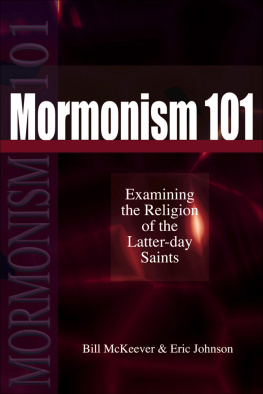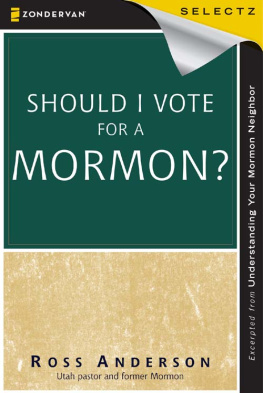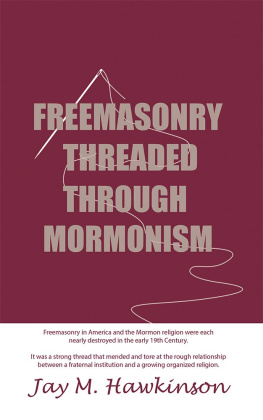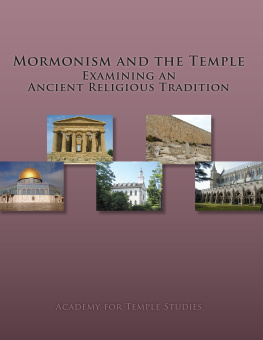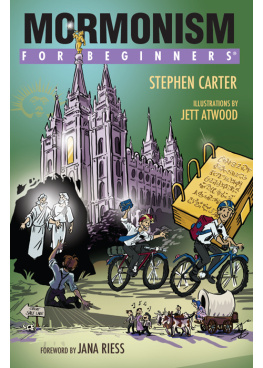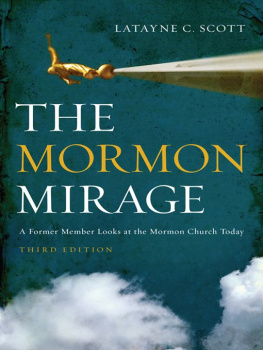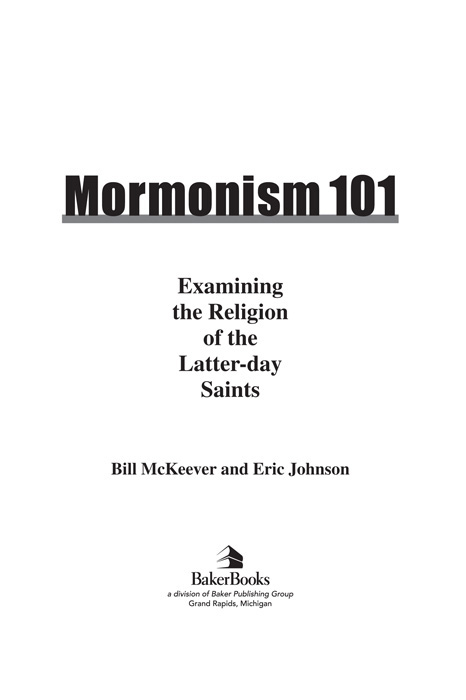
2000 by Bill McKeever and Eric Johnson
Published by Baker Books
a division of Baker Publishing Group
P.O. Box 6287, Grand Rapids, MI 49516-6287
www.bakerbooks.com
Ebook edition created 2012
All rights reserved. No part of this publication may be reproduced, stored in a retrieval system, or transmitted in any form or by any meansfor example, electronic, photocopy, recordingwithout the prior written permission of the publisher. The only exception is brief quotations in printed reviews.
ISBN 978-1-5855-8099-6
Library of Congress Cataloging-in-Publication Data is on file at the Library of Congress, Washington, DC.
All Scripture is taken from the King James Version of the Bible.
To our children: Kristen, Kendra, and Jamin McKeever, and Carissa, Janelle, and Hannah Johnson. Psalm 127:3 says, Lo, children are an heritage of the L ORD : and the fruit of the womb is his reward. May you always realize the love your dads have for you, but especially the abundant love and mercy of your Father in heaven who gave His Son so that we might experience everlasting life.
Special thanks to Lane Thuet, Dick Baer, and Suzanne Schimmeyer, as well as a number of other friends, for the many hours they devoted to proofing our first draft and for offering a number of valuable suggestions, many of which were implemented in the final manuscript. May God bless all of you.
Contents
Preface
Mormonism is Christianity; Christianity is Mormonism; they are one and the same, and they are not to be distinguished from each other in the minutest detail.... Mormons are true Christians; their worship is the pure, unadulterated Christianity authored by Christ and accepted by Peter, James, and John and all the ancient saints.
Apostle Bruce McConkie, Mormon Doctrine, 513
The leaders of the Church of Jesus Christ of Latter-day Saints, also known as the Mormon Church or the LDS Church, have made a concerted effort in recent years to make their organization appear more like that of mainstream Christianity. Because it is not uncommon for Latter-day Saints (Mormons) to tell their Christian friends or coworkers, Were Christians just like you, many outside of this unique religious faith may wonder just what is the actual doctrinal position of the LDS Church. Many have sought a resource that compares the teachings of the Mormon leaders, both past and present, with those of the Bible. We believe the book you hold in your hands will meet this need.
Of course, the big question is just what constitutes Mormonism? Are we to judge the LDS Church by the opinion of the average lay member? While on the surface this may sound like a good way to evaluate a religious system, our experience has shown that far too many Latter-day Saints have not taken the time to do an in-depth investigation into the history and doctrines of their faith. Should we base our study on the latest trends coming out of Brigham Young University? We admit that BYU has employed some great minds, but do professors at a church-owned school have the authority to interpret doctrine for the rest of the LDS Church?
Like many religious traditions, the LDS Church has its own unique set of scriptures. While it officially includes the Holy Bible as one of its texts (specifically the King James Version), Latter-day Saints also use the Book of Mormon, the Doctrine and Covenants (abbreviated throughout as D&C ), and the Pearl of Great Price. These are known as the standard works.
However, page 55 of the LDS Church manual Gospel Principles states that, in addition to these four books of scripture, the inspired words of the living prophets and LDS Church publications can also be used to guide its members in the ways of truth. If this is the case, then we would be remiss if we ignored the many statements that have come forth from these leaders who many Mormons feel are called by God to not only lead the church but clarify its scriptures as well.
The Mormon Church government is a hierarchy that at the very top comprises:
- The First Presidency, composed of the Prophet/President and his two counselors
- The Council of the Twelve, otherwise known as the Twelve Apostles
- The Quorums of the Seventy
Our experience shows that many Latter-day Saints have a great respect for their leaders, both past and present. However, when members are confronted with an embarrassing statement from one of their general authorities, it is not uncommon for them to quickly distance themselves from the quote, claiming it is the mere opinion of that individual. While this may certainly be true, the student of Mormonism still needs to carefully weigh what LDS leaders have said and are saying, since it gives us an idea of what kind of men they really are. For example, if certain LDS leaders continually make irresponsible comments, we must take that into consideration. Also if it can be demonstrated that such an opinion was believed by church members to be true, then it places into serious question the LDS claim that its prophets cannot lead the church astray.
To be sure, the current presentation given by LDS Church leaders is much different than earlier years. When Joseph Smith began his new religious movement in 1830, there was no great effort to meld or compromise the teachings of the Mormon Church with those of nineteenth-century Christianity. Instead, early leaders prided themselves on their uniqueness and they boldly and publicly proclaimed their differences. They made little or no effort to associate with what they considered apostate Christendom.
More recently, however, some members of the LDS Church have felt it was time to declare to the world that the differences are only superficial or, at best, a problem of semantics. Some Mormon apologists have even declared that the divide between Christianity and Mormonism is not all that wide. Having studied this movement for a great portion of our lives, we find such concessions incredible, for if this is really true, it brings into question the Mormon concept of a so-called complete apostasy.
We can see this shift to an ecumenical spirit in the Mormon Churchs offering of free Bibles in TV and magazine advertisements, making this religion seem just like a Christian denomination. It appears that the LDS public relations department is purposely trying to minimize any doctrinal differences in order to appeal to a larger base of potential converts. We are convinced that if the Mormon Church leaders were to be more forthright with their unique teachings, the conversion rate would be much lower.
While many have been led to believe that there is nothing intrinsically wrong with LDS theology, we find that a number who hold this position base it on emotion rather than on a careful doctrinal comparison. We are not denying that Mormons, for the most part, are honest, sincere, and hardworking people. However, such virtues have never been a qualifying factor for deciding whether one is a Christian. Many religions throughout the world have such people within their ranks. The logical question should be, Can an individual or organization willfully deny or distort the basics of the Christian faith and still be considered Christian?
Due to space limitations, we will often use ellipses in a quote (indicating that some material was skipped) to concentrate on the pertinent information. While there is always a danger of taking quotes out of context, especially when ellipses appear, we have purposely made an effort to not alter the meaning of any quote. We invite readers who would like to study further the issues in this book to look up the quotes in their complete context.
Next page
